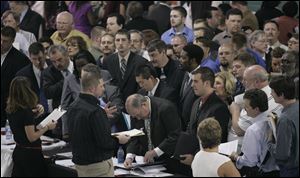
Toledo lagging in recovery
9/15/2009
A spring job fair drew scores of applicants, but a national study finds the metro area is not creating enough jobs to ease unemployment.
A study measuring how the recession is affecting the 100 largest U.S. metro areas found that Toledo continues to lag most of the nation and that the area's economy is still contracting.
However, while Toledo ranked 91st out of 100 in the study by the nonprofit Brookings Institution for the first quarter of 2009, the organization would only say Toledo was “in the bottom 20” for the second quarter.
Other nearby cities in that grouping include Dayton and Youngstown in Ohio, and Detroit and Grand Rapids in Michigan.
No metro area in Ohio or Michigan finished in the top 20 of the study, which measures recent and long-term increases in unemployment, changes in the overall economy, and depreciation of house prices. The study was released today.
The authors found that while housing prices and foreclosures have stabilized somewhat, high unemployment and the loss of manufacturing continue to plague metro Toledo.
“Toledo is among the bottom metros in the country based on its overall performance, and that's … in large part because of loss of auto-sector jobs,” said Jennifer Vey, a fellow with the Brookings Institution's Metropolitan Policy Program in Washington. “In June, Toledo ranked as among the 10 worst [large metro areas] in terms of unemployment.”
The study said employment in the region declined 10.2 percent since the first quarter of 2006, the statistical peak of employment locally over the past five years, Ms. Vey said. Other metro areas averaged a loss of 3.8 percent of jobs from their local peaks, while the nation fell 4.1 percent from its peak during the same period.
The loss placed metro Toledo as the fifth-worst metro area nationally during the second quarter.
An unemployment rate of 14.2 percent for the region — and its 6.6 point change from the previous year — was dramatically higher than the 9.7 percent average among the 100 metro areas studied, and ranked Toledo seventh-worst nationally overall, and third from the bottom in terms of year-over-year change.
Meanwhile, Toledo's gross metropolitan product — the measure of all goods and services made in the local economy — has fallen 7.6 percent since the third quarter of 2005, and an additional 1.2 percent since the end of the first quarter of 2009. Both ranked the region 93rd out of 100 in the survey.
The only relatively bright spot in the survey locally was in real estate. Housing prices continue to fall in the metro area, Ms. Vey said. They dropped 0.9 percent in the second quarter from the prior-year period, compared to an average loss of 4.4 percent among the top 100 metro areas.
Nationwide, housing prices dropped 1.7 percent between June, 2008, and June, 2009, the study found. The study placed Toledo at 48th nationally in the rate of home-price decline.
Similarly, the number of repossessed homes was 2.43 per 1,000 properties, compared to 4.2 per 1,000 in metro areas overall and 3.34 across the nation.
Toledo ranked 55th nationally in this category.
The change in the number of such properties between the first and second quarter indicated that foreclosures have slowed locally, while most other metropolitan areas and the nation overall continue to experience the fallout from the mortgage crisis.
“Housing prices are still dropping [in metro Toledo], while they are increasing in a number of other metros in the Great Lakes region,” Ms. Vey explained. “Toledo, like all struggling places, needs to focus on ways to jump-start its economy and diversify its economy.”
Contact Larry P. Vellequette at:lvellequette@theblade.comor 419-724-6091.